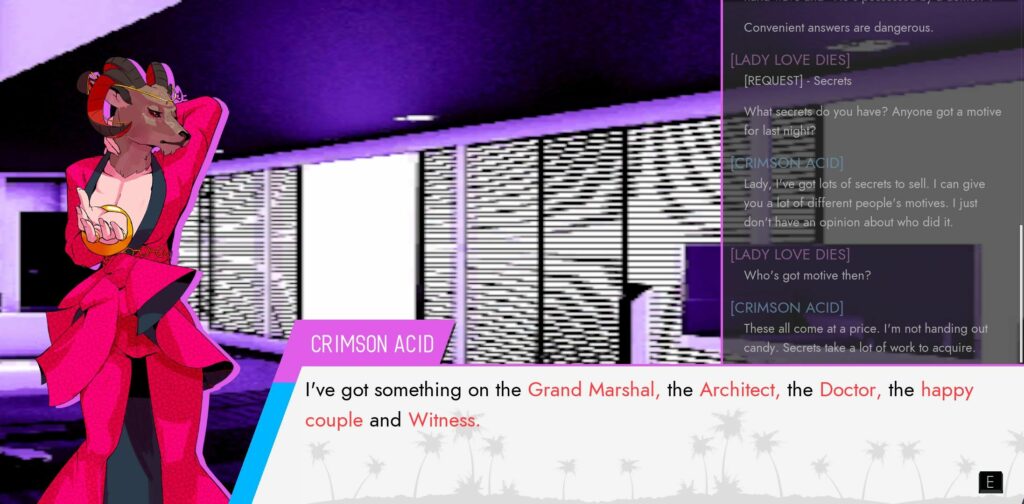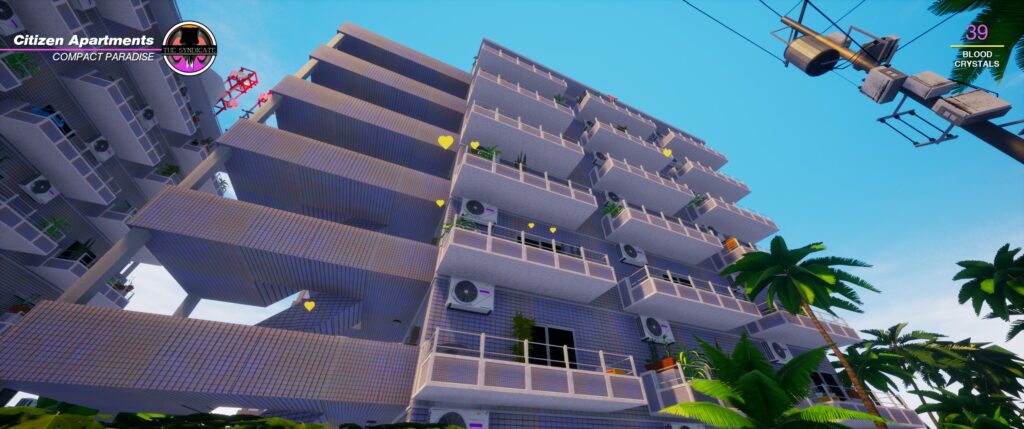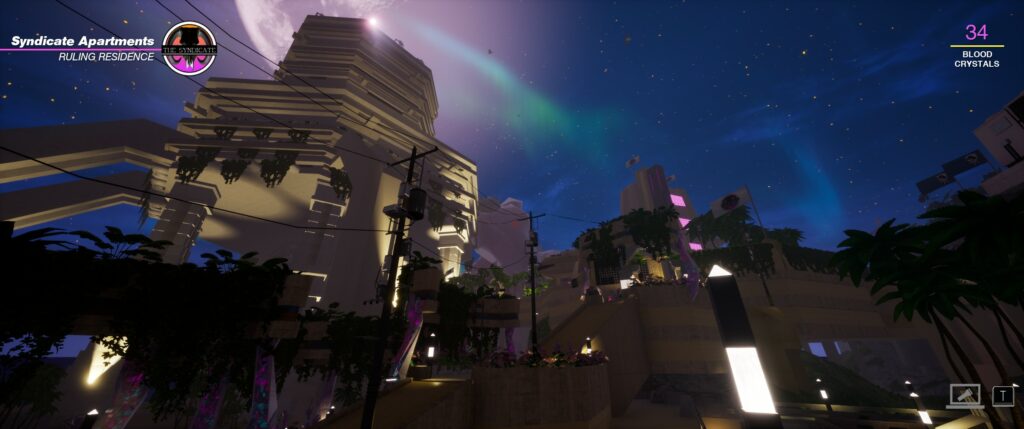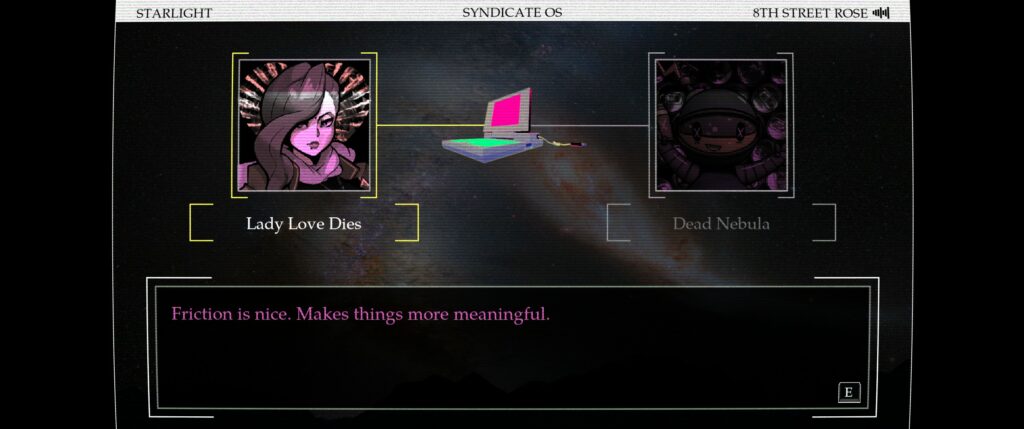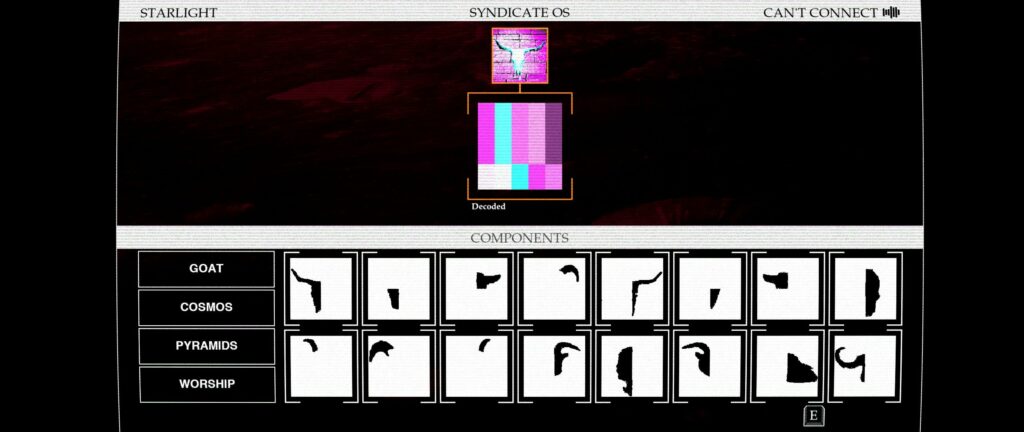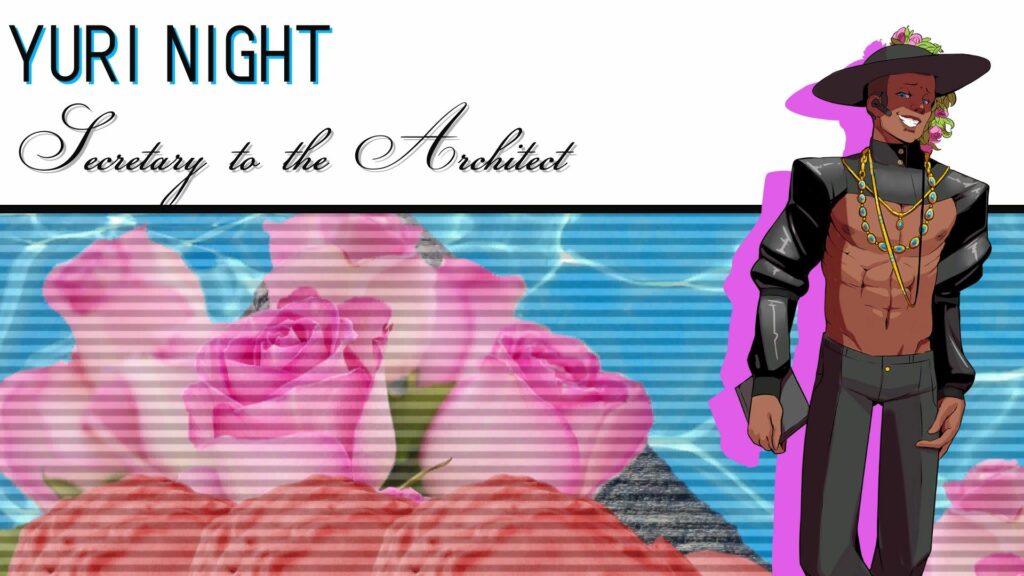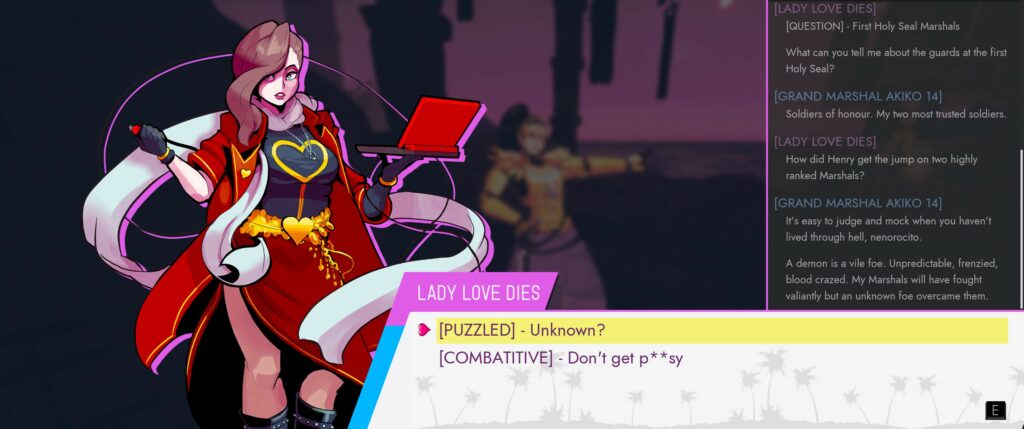Paradise Killer is a game of three parts: an island exploration, a crime investigation visual novel, and a trial. There are serious flaws with all three of these parts, but it might be worth 5 hours anyway. Unfortunately, it’s a 10 hour game (from my 99% run through). This should be spoiler free, just in case!
There is a phrase that is supposed to encapsulate Paradise Killer: that the facts are not the truth. I can’t decide if they were in support of that statement or against it. The narrative was definitely yelling that at me at every chance it got (almost as much as it said “Paradise Killer does not autosave”), but the mechanics end up not supporting it at all if you’ve seen a single police procedural.
Let’s back up a little. You’re an immortal human (Lady Love Dies) who is part of a cult that abducts humans to an extradimensional island and sacrifices them to revive alien elder beings to some unclear end. You’re their “investigator” but have been imprisoned for a little over 8,214 years until the murder of the entire cult leadership forces Judge (the judge, if you couldn’t guess) to rescind your exile in return for solving the case. One of your best sources of information is a goat-headed femme fatale called Crimson Acid, and the entire experience is wrapped in a Vaporwave and Electronica/Jazz aesthetic. Now might also be a good time to talk about anime and the unimportance of premise.
Anime (and Japanese culture in general) is well known for using unusual concepts in their media and culture. But if there’s one thing that has taught me, it’s that premise is probably the element least indicative of quality. What might seem like a boring premise can be made into a riveting experience through good execution, and the most exciting premise can quickly become repetitive and boring with poor execution. So while the pitch of Paradise Killer means that there are references to numerous events and concepts that might be interesting, it all comes down to the mechanics to tie it together.
And what I ended up doing for the vast majority of my play time was picking up entirely useless collectibles while fighting with the game’s geometry to let me get over the ledge in front of me that was just a bit too high, or running around to get back to the tower I had just fallen off. When I started out, I was picking things up left and right since they seemed important. By the time I finished picking everything up, I realized that practically nothing was.
These collectibles came in roughly three types: first, there is the currency you use to purchase secrets, upgrades, and fast travel – and this is also the first problem. Since the currency you use is both limited and used for both plot-relevant items and the fast travel system, I was highly incentivized to not fast travel in case I needed the money later – it’s this that made me pinch every penny (which turned out to be unnecessary, though I couldn’t have known that at the time). Just for reference, you end up with 53 extra currency at the end of the game if you buy literally everything, solve every mystery, and pick up every collectible. It’s easy to say, but I can’t help but wish that the coins were used only for fast travel (as a reward for exploration) and upgrades/secrets were purchased using favors or tasks (perhaps changing how you investigate the characters or for ignoring indiscretions).
The second type of collectible are random items scattered about, and I cannot think of a more descriptive explanation. I could not tell you what they were for or how they contributed to the game in any way. While a limited set contained snippets of backstory, most never came up in gameplay and there was no reward for finding them beyond… finding them. The only reference to the collectibles is a snide comment from another character about you picking up trash – and I couldn’t even disagree with them.
There are a few of these types of collectibles which almost cross into meaningful territory – like the vending machines or alcoholic drinks – but in the end those also contribute almost nothing to the story.
The third type of collectible are short conversations with a demon/alien that lives on the island. Again, absolutely nothing comes of these conversations and almost none of them contain any meaningful character development or backstory. Some do contain what I believe were meant to be jokes.
As I was exploring the island, I finally spent some of the money I had been collecting on a foot bath. It was then that I discovered that you get extra abilities in doing so – a collectible radar, a double jump, and an air dash. While these might sound cool, they are all the most anemic versions of each that you could possibly imagine. I was most excited for the collectible radar, but it turns out your mind powers can only find the useless collectibles and fast travel stations – almost nothing directly plot-relevant or investigation worthy. There’s a joke here somewhere.
It also has the downside of taking 5-10 seconds of standing still to send out one ping, and it only lasts 30 seconds or so of real time. With so many collectibles on varying elevations, this adds an eternity of waiting to already slow interactions and menus – something the game tries to pass off as making actions more meaningful. To that I must say: whether or not it makes things more meaningful (which it does not in a game without time constraints), it certainly makes things less immersive when I’m reminded I’m in a game every time I want to interact with a system other than the movement keys.
I didn’t realize you could purchase the double jump or air dash until close to the end of the game (admittedly my own fault), but since the double jump makes you jump about 5 feet high instead of 4 feet high and since the air dash works once per jump and only pushes you a few feet ahead, I don’t think I missed terribly much – other than a couple times where I fought with the physics engine more than I needed to.
What I’m complaining about here has one root cause – the game doesn’t want to get out of your way and just let you have fun. Movement and interactions should be seamless and effortless, especially in an open world exploration game. Just Cause 2 understands this. Saints Row IV understands this. Paradise Killer does not. Paradise Killer should have had a super jump, a grappling hook, or anything that meant I didn’t have to spend 30 seconds walking up a fire escape for the twentieth time.
So that’s the first and largest part of the game. Admittedly, the colossal wastes of time of this first part may have colored my perspective on the rest of the game – but let’s look at them anyway. As a investigatory visual novel, there’s a lot to like. There aren’t a whole lot of choices (though there are a lot of “choices”), but a picture of the crime slowly builds as you talk to each of the characters, all of whom are colorful, (mostly) well-written, and interesting in one way or another. Like this guy:
You have to have a little respect for anyone that wears a shirt like that.
But that’s kinda where the good news ends. Remember how I mentioned that the theme was supposed to be that “facts are not the truth”? Well, there’s really only one answer to the crime and the only way you would miss that is if you just ignore the facts or don’t investigate. So, “ignorance is not the truth” I guess. Whether you think people should be prosecuted for their crimes is another question, but after investigating everything I was perfectly satisfied with the narrative of the crime that I presented in the trial portion. Who I should accuse seemed obvious even half-way through my playtime, and my expectations were never subverted. I missed one element somewhere that would have added one final mystery to solve in trial, but I wouldn’t have wanted to anyway since I already knew the answer and didn’t particularly care (that’s as far as I can go without spoilers).
This is the problem, and it became glaringly obvious in the third part of the game, the trial: if you’ve collected all the evidence (which you’re basically forced across if you pick up collectibles and ask everyone all the questions) you just sit there, choose your suspect, and hit “e” a bunch of times until they just confess. There’s no questioning, no cross-examination, no misleading evidence, not a hint anywhere that you might be wrong. I think that’s supposed to carry the message that you’re the law in this land and you define the truth, but that message is undercut by the fact that it would seem that you really do have the “true” and clear picture of the crimes. It’s like saying that you define 1+1=2 as truth. Could you say 1+1=3? Could you accuse different people and succeed? Probably. But then you’re ignoring reality (ignoring philosophical questions about the nature of mathematics for the moment), not defining truth.
So that’s Paradise Killer. It’s an enjoyable visual novel with elements that could have elevated the experience, but ended up only occasionally rising above trite diversions. Actually, one last note – they were strangely sensitive about censoring swears (see above) for a game with multiple murder scenes, blood sacrifice, and romance options (admittedly, “fade to black” ones). And the repeated reaction line “nani the hell” annoyed me far more than it probably should have.
I did finish the game, so I was going to put it into Tier Two on the merits of the setup, intriguing mystery, and ambition alone. But as I wrote this, I realized that I couldn’t actually recommend playing through this game. It came close, but so much of it was mere tedium that I can’t. So, sadly, Tier Three. Play Murder by Numbers instead.

